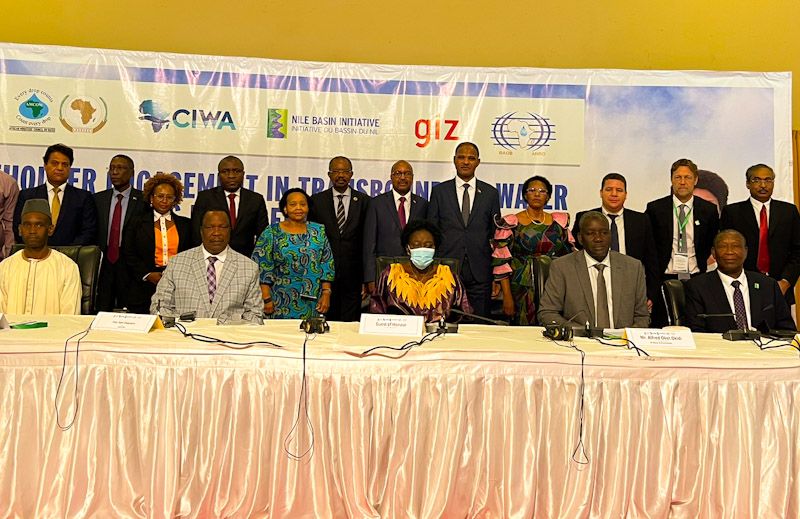

Uganda’s First Deputy Prime Minister Rebecca Kadaga seated middle infront officiated the opening ceremony of the high level engagement for Lakes and River Basin organisations meeting held in Kampala in May 2023
The recent move by the Egyptian government to seek support from the Arab league in its effort to dominate the waters of the Nile has done more to encourage the rest of the countries on the continent to coalesce and strengthen ties.
Last week, at least 19 Lakes and River Basin Organizations and a number of Regional Economic Organizations (RECs) from across the African continent met at Speke Resort Munyonyo under the banner of “High Level Engagement on Transboundary Water Resources Management in Africa.
The four-day meeting was opened by the first deputy Prime Minister Rebecca Kadaga and closed by the State Minister for environment Betty Anywar.
Its objectives that included, among others, the need to increase collaboration among the participating river basin organisations through planning, management and development of water resources, were hailed by many speakers as timely especially in an era of climate change but also as a way to maximize the opportunities of water resources from across the continent.
As with previous recent meetings of this kind, Egypt’s absence has attracted muted warnings about the numerous risks of failing to cooperate with countries that share the Nile river, including the most extreme prospect of military confrontation.
At Munyonyo last week however, renowned scholar and Pan-African Kenyan-born public speaker Prof. Patrick Lumumba, addressed Egypt’s belligerent positions more directly by arguing that its colonial-era position is not consistent with any modern day international law that requires cooperation over shared water resources.
“In the continent of Africa, we’re incapable of understanding the economic potential of river basins.
Look at the Grand renaissance dam with the potential to generate 10,000 Mega Watts of electricity. Imagine the industries that it can inspire. We’re now in the era of the 4th and perhaps 5th industrial revolution. You need power, and water is the resource that is going to give us sustainable energy. It is something that the Nile river can give us. But what must we do in order to ensure that we have good diplomacy? The Ethiopians say they are going to start filling the dam, and the Egyptians
“On 19th of this month, the Egyptians stopped being African, they b ecame Arabs. They attended a meeting of the Arab league, and the Arab league say they will not allow the Grand renaissance dam to be filled.
“They are saying that if push comes to shove, we will not hesitate to use force. Don’t imagine that it cannot happen. Can we stop it, yes we can. Under the auspices of the African Union and under the Eigis of the Nile Valley Basin. There’s need for urgent and important diplomacy that requires us to say that this is a shared resource, there’s need for all of us by saying that you Ethiopia generate power but be mindful of Sudan, be mindful of Egypt. Be mindful of lake Turkana.
Do I see movement in this direction, no I don’t . What I see is that we move from treaty to protocol to declaration to symposia, to colloquia without proper movement. The time is now to put a stop to these declarations and to enter into constructive engagement which is time bound.
The rivers can be the fountain of economic activity. They can be the engines of agriculture, so that we stop depending on rain-fed agriculture. But the constant theme is this. It is shared resources.
In many ways, the waters that we’re talking about can be shared. But we’re greedy, arrogant, egotistical.
What if we say that what is going to govern water resources in Africa is Ubuntu. You will find that trade across national borders is booming because countries would then be talking to each other.
Lumumba’s fiery speech attracted positive responses from participants, judging by the reactions and rousing applause he received. Indeed many participants pointed out that the cooperative model for the use of water resources has been adopted by the rest of the river basins in Africa with relatively good outcomes.
Many however condemned the dependency mentality of most of the river-basin organisations and indeed most African governments and development agencies, which they noted stifles progress and most times frustrates their ambitions as donors determine what they have to focus on.
Despite the apparent sense of fatigue with donor money, there was an expression of commitment, at least from some of the biggest partners such as the Germany government through its GIZ programme that they are willing to support further conversations over water resources in order to ensure that the continent achieves some level of food, energy and water security.
Dr. Malte Grossman, the head of the Nile Basin Projects at GIZ stressed the importance of sharing information and experiences as a mechanism optimizing the benefits of water resources but also prepare to face the urgent challenges facing the continent particularly food and energy insecurity.
The meeting ended with the signing of a declaration that urges members to meet on an annual basis to further the discussions and collaboration.


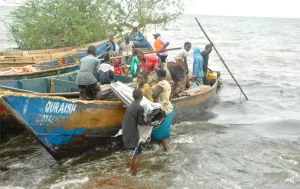

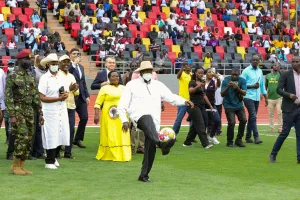
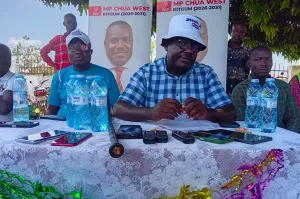
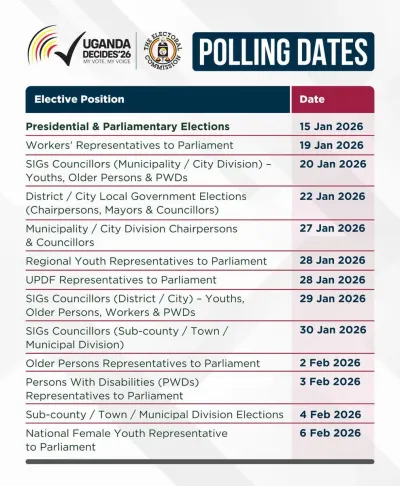



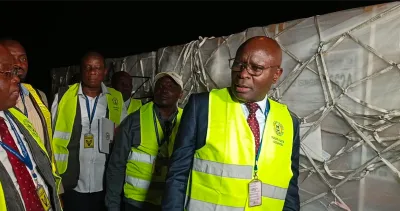


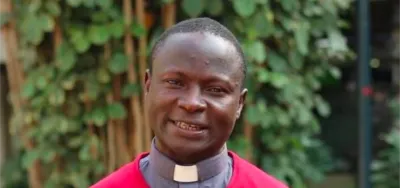
Sunrise Reporter
Leave a Comment
Your email address will not be published.